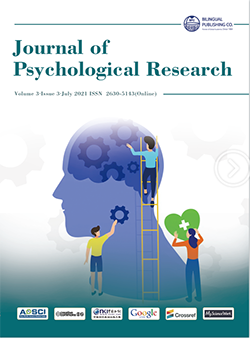-
697
-
588
-
403
-
318
-
299
Assessing the Psychometric Properties of Hindi Version of Relationship Structure (ECR-RS) Scale among Young Adults
DOI:
https://doi.org/10.30564/jpr.v3i3.3464Abstract
Relationship science has proliferated in the last few years. However, most of these studies have remained focused on western culture. An important reason for the lack of relationship studies in the non-western, particularly Indian context, is the lack of culturally validated scales. The present study was aimed at assessing the psychometric properties of the relationship structure (ECR-RS) scale. ECR-RS is a nine-item questionnaire used to measure attachment patterns for different relationships. It has been translated and modified in multiple languages. The study (N = 223, undergraduate students, 32.7% females) evaluated the Hindi version of ECR-RS scale’s psychometric properties for mother, father, close friend, and global attachment. The confirmatory factor analysis supports the presence of the two-factor model as originally theorized in ECR-RS. The findings support the reliability and validity of Hindi ECR-RS. The study contributes methodologically by providing an instrument of attachment styles, which could be a valuable resource for practitioners and researchers in the Indian context.
Keywords:
Assessment; Attachment; Family; India; Relationships; Reliability; ValidityReferences
[1] Reis HT. Steps toward the ripening of relationship science. Pers Relatsh. 2007;14(1):1-23. Available from: https://doi.org/10.1111/j.1475-6811.2006.00139.x.
[2] Henrich J, Heine SJ, Norenzayan A. Most people are not WEIRD. Nature. 2010;466(7302):29-29. Available from: https://doi.org/10.1038/466029a.
[3] Sreenivas M. Wives, widows, and concubines: The conjugal family ideal in colonial India. Bloomington: Indiana University Press; 2008.
[4] Maitra S, Gayathri KR. Divorce Trends and its Implications for Children' s Well-being : A Study of Family Court in Mumbai Final Report By. Mumbai; 2015.
[5] Finkel EJ, Simpson JA, Eastwick PW. The Psychology of Close Relationships: Fourteen Core Principles. Annu Rev Psychol. 2017;68:383- 411. Available from: https://doi.org/10.1146/annurev-psych-010416-044038.
[6] Cassidy J, Shaver PR. Handbook of Attachment: Theory, Research, and Clinical Applications. Guilford Press; 1999.
[7] Ravitz P, Maunder R, Hunter J, Sthankiya B, Lancee W. Adult attachment measures: A 25-year review. J Psychosom Res [Internet]. 2010;69(4):419-32. Available from: http://dx.doi.org/10.1016/j.jpsychores.2009.08.006.
[8] Hazan C, Shaver P. Romantic Love Conceptualized as an Attachment Process. J Personal Soc Psychology. 1987;52(3):511-24. Available from: https://psycnet.apa.org/doi/10.1037/0022-3514.52.3.511.
[9] Bartholomew K. Avoidance of Intimacy: An Attachment Perspective. J Soc Pers Relat. 1990;7 (2):147-78. Available from: https://doi.org/10.1177%2F0265407590072001.
[10] Bartholomew D, Horowitz LM. Attachment styles among young adults: A test of a four-category model. J Pers Soc Psychol [Internet]. 1991;61(2):226-44. https://doi.org/10.1037/0022-3514.61.2.226.
[11] Fraley RC, Waller NG. Adult Attachment Patterns: A Test of the Typological Model. In: Simpson JA, Rholes WS, editors. Attachment Theory and Close Relationships. New York: Guilford Press; 1998. p. 77-114.
[12] Brennan KA, Clark CL, Shaver PR. Self-Report Measurement of Adult Attachment: An integrative Overview. In: Simpson JA, Rholes WS, editors. Attachment Theory and Close Relationships. New York: Guilford Press; 1998. p. 46-76.
[13] Fraley RC, Waller NG, Brennan KA. An Item Response Theory Analysis of Self-Report Measures of Adult Attachment. J Personal Soc Psychology. 2000;78(2):350-65. DOI: https://doi.org/10.1037/0022-3514.78.2.350.
[14] Favez N, Tissot H, Ghisletta P, Golay P, Notari SC. Validation of the French version of the experiences in close relationships- revised (ECR-R) Adult romantic attachment questionnaire. Swiss J Psychol. 2016;75(3):113-21. Available from: https://doi.org/10.1024/1421-0185/a000177.
[15] Fraley RC, Heffernan ME, Vicary AM, Brumbaugh CC. The Experiences in Close Relationships-Relationship Structures Questionnaire: A Method for Assessing Attachment Orientations Across Relationships. Psychol Assess. 2011;23(3):615-25. DOI: https://doi.org/10.1037/a0022898.
[16] Feddern Donbaek D, Elklit A. A validation of the Experiences in Close Relationships-Relationship Structures scale (ECR-RS) in adolescents. Attach Hum Dev [Internet]. 2014;16(1):58-76. Available from: http://dx.doi.org/10.1080/14616734.2013.850103
[17] Moreira H, Martins T, Gouveia MJ, Canavarro MC. Assessing adult attachment across different contexts: Validation of the Portuguese version of the experiences in close relationships-relationship structures questionnaire. J Pers Assess. 2015;97(1):22-30. Available from: https://doi.org/10.1080/00223891.2014.950377
[18] Chaperon, Dandeneau S. Le Questionnaire sur les structures relationnelles : adaptation et validation de la version française du Experiences in Close Relationships-Relationship Structures Questionnaire. Rev Eur Psychol Appl [Internet]. 2017;67(4):213- 21. Available from: http://dx.doi.org/10.1016/j.erap.2017.04.002
[19] Zhang Q, Hou Z-J, Fraley RC, Hu Y, Zhang X, Zhang J, et al. Validating the Experiences in Close Relationships-Relationship Structures Scale among Chinese Children and Adolescents. J Pers Assess [Internet]. 2021;0(0):1-12. Available from: https://doi.org/10.1080/00223891.2021.1947844
[20] Sarling A, Jansson B, Englén M, Bjärtå A, Rondung E, Sundin Ö. Psychometric properties of the Swedish version of the experiences in close relationships-relationship structures questionnaire (ECR-RS global nine-item version). Cogent Psychol [Internet]. 2021;8(1). Available from: https://doi.org/10.1080/23311908.2021.1926080
[21] Deveci Şirin H, Şen Doğan R. Psychometric Properties of the Turkish Version of the Experiences in Close Relationships-Relationship Structures Questionnaire (ECR-RS). SAGE Open. 2021;11(1): 1-15. Available from: https://doi.org/10.1177/215824402110060
[22] Meyers LS, Gamst G, Guarino AJ. Applied Multivariate Research: Design and Interpretation. Sage Publications; 2006.
[23] Henseler J, Ringle CM, Sarstedt M. A new criterion for assessing discriminant validity in variance-based structural equation modeling. J Acad Mark Sci. 2015;43(1):115-35. DOI: https://doi.org/10.1007/s11747-014-0403-8
[24] Jaiswal T. Indian Arranged Marriages. London and New York: Routledge; 2014.
[25] Kakar S. Exploring Indian Sexuality. Penguin Books; 1989.
[26] Roland A. In search of self in India and Japan: Toward a cross-cultural psychology. New Jersey: Princeton University Press; 1988.
[27] Mikulincer M, Shaver PR. Attachment in Adulthood: Structure, Dynamics, and Change. New York: Guilford Press; 2007.
Downloads
How to Cite
Issue
Article Type
License
Copyright © 2021 Ritesh Mehta Kumar

This is an open access article under the Creative Commons Attribution-NonCommercial 4.0 International (CC BY-NC 4.0) License.




 Ritesh Mehta Kumar
Ritesh Mehta Kumar






